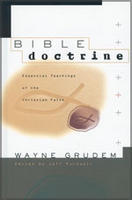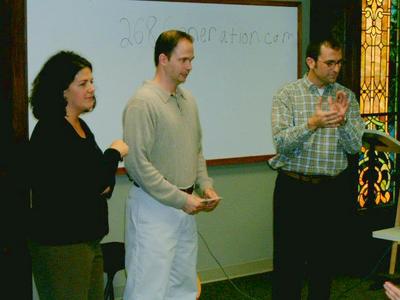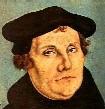As stated earlier, the Bible models and describes preaching as expository preaching, which is the reason that it makes sense to preach this way. 2 Timothy 3:16 declares Scripture to be “inspired by God - profitable for teaching, for reproof , for correction, for training in righteousness; that the man of God may be adequate, equipped for every good work.” Simply put, because the Bible is “inspired by God” - literally breathed out by God – by God whose nature is impeccably perfect (Matthew 5:48; Titus 1:2), we know that it is perfect (Psalm 19:7 “The law of the LORD is perfect”). This of course is the doctrine of inerrancy, which automatically affirms expository preaching. “With a commitment to inerrancy, the expositor is equipped with a true message, with true intent, and with true application. It gives his preaching perspective historically, theologically, contextually, literally, synoptically, and culturally. His message is God’s intended message.”
[15] “Inerrancy demands an exegetical process and an expository proclamation. Only the exegetical process preserves God’s Word entirely, guarding the treasure of revelation… Expository preaching…is the essential link between inerrancy and proclamation…mandated to preserve the purity of God’s originally given inerrant Word and to proclaim the whole counsel of God’s redemptive truth.”[16]
Identification of biblical preachers and examples of biblical preaching
Not only is expository preaching rooted in biblical theology (i.e. inerrancy) it is also documented throughout biblical history. “The expository sermon is the systematic explanation of Scripture done on a week-by-week, or even day-by-day, basis at the regular meeting on the congregation. This practice goes back to the worship of the synagogue long before the time of Jesus, when the Law was read through Sabbath by Sabbath, beginning each time where one had left off the Sabbath before. The idea was that the whole Law would be regularly read through in the course of worship.”[17] Moses, one of God’s first preachers, marks an historic precedent for how preachers handle God’s Word today. When Moses received the Law directly from God, what he did first, there at the foot of Mount Sinai, was read it - some say Moses preached it - to the people with great solemnity. A second significant preacher in biblical history was Ezra, a man whose ministry, like Moses’, was precedent-setting. Ezra stands out as Israel’s key spiritual leader during Israel’s reconstitution after exile (see Nehemiah 7:5ff.), and the way he lead God’s people was by reading and explaining the Law – God’s Word. Nehemiah 8:8 is clear - the Law was read from beginning to end and then explained. Here God established a tradition that carried on throughout Old Testament times up through Jesus’ ministry. Jesus read and expounded the Law during temple worship on the Sabbath (Luke 4:16 “As was his custom, he went to the synagogue on the Sabbath day, and he stood up to read”). The Apostle Paul, in the same way, establishing the New Testament church, read and explained the Scripture in the synagogues on the Sabbath (Acts 17:2 “Paul…as was his custom…on three Sabbath days…reasoned with them from the Scriptures”). Understanding this long-standing biblical history clearly shows why the New Testament church is designed to gather corporately for the public reading and expository preaching of Scripture (1 Tim. 4:13). Consequently, this tradition has rightly been passed down throughout the centuries beginning with the early church to present.
Rehearsing this legacy of the public reading and preaching of God’s Word serves as a timely reminder of the value of biblical exposition in the church today. Beginning from the earliest biblical history to present here is a brief overview of the mountain-peak expositors from Moses to present documenting this means of grace – preaching.
Moses, as I mentioned before, was a trailblazing preaching. He received the Law of God at Mount Sinai and his first step was to publicly read it to his congregation – Israel. Moses’ preaching doesn’t stop with public reading but immediately (like all expositors must do) calls the congregation to commitment - to obey God’s word (Exodus 24:1-11).[18] I believe in this context Moses was fulfilling the ministry of an expository preacher. Even though he was reading the Law he had received directly from God, note that Exodus 21-23 is an exposition of the Decalogue from Exodus 20. The case can be made that chapters 21-23 of Exodus, though inspired Scripture, is also preaching – maybe the first of its kind.[19] This is found again in the book of Deuteronomy, which is the second Law or reiteration of the Law. What was the content of Moses’ preaching? Simply put he emphasized three things:
1. “remembrance…recounting God’s saving acts…
2. interpretation…elaboration and application of the law…[and]
3. constant urging that Israel be obedient to the Law.”[20]
From Moses’ ministry of the Word it can be seen that preaching was then, and remains today, the means by which “we [God’s people] experience God’s presence.”[21] In essence God chose to reveal himself through heard truth, and this auditory ministry stood in stark contrast to the rebellious visually-driven idolatry which Israel so quickly fell into (Exodus 32). The New Testament says it this way: “So faith comes from hearing, and hearing through the word of Christ” (Rom. 10:17). “God has not revealed himself to our sight but rather to our hearing; he has revealed not his form but his will.”[22]
Though prophets are typically held out as the preachers of the Old Testament, the priests also exercised a ministry of interpreting the Word of God. “Priests were concerned with the interpretation and application…as it was revealed in the Law of Moses, while the prophets were concerned with proclaiming the Word of God as God revealed that Word directly to the prophet.”[23] Samuel, for instance, functioned both as priest and prophet, both presiding at a sacrifice at a high place where Saul sought him out to inquire of the LORD, and soon after anointing Saul as the first King of Israel. However, because Saul disobeys the Lord early in his reign, Samuel taking his prophetic role proclaims God’s judgment to Saul in stinging rebuke (1 Samuel 15:22 “To obey is better than sacrifice”).[24]
Isaiah, a man who interceded for Israel in a priestly role (Isaiah 6:1-7,) is also known for his ministry as prophet. He was a man whose life was given to receiving and preaching oracles from God (Isaiah 6:8). Like the other prophets, Isaiah’s prophetic preaching at times expanded beyond his immediate audiences. For instance, when King Ahaz spurned Isaiah’s message to him, his reply turns out to be the wonderful Messianic promise of the birth of Immanuel (Isaiah 7:14-17). This being the case, its important to remember that the prophet’s primary role was calling people of their own day to repent and obey the Lord (Isaiah 1:2-31) along with explaining it.[25]
Understanding prophecy like this reveals clear parallels between prophets and preachers. For instance, the very obvious homiletical nature and delivery from prophets like Amos is noticeable when read in terms of its original context.[26] Understood this way, the prophets were men of God who were preachers.
By the same token, some of the Wisdom literature should also be remembered in the subject of preaching and biblical history. For instance, the book of Ecclesiastes is known as a sermon preached by Solomon the preacher (Ecclesiastes 1:1). Because of this, I’ve heard it suggested that not to teach Ecclesiastes as a sermon is to do an injustice to the book, since it is a written sermon.
The New Testament wastes no time highlighting the preaching ministry of John the Baptist. This prophet and preacher’s life was given to declaring the coming Christ, and calling men to repent and believe (Mark 1:4; John 1:15, 29.)[27] John’s preaching ministry appropriately fades to the background when the preaching ministry of Jesus comes on the Jewish scene (Mark 1:14).
Jesus’ entire ministry was summarized in his exposition from the text he chose in the synagogue – Isaiah 61:1-2. From this, “the principle that Scripture is to be interpreted by Scripture was…well established.”[28] “The sermons of Christ…the Sermon on the Mount… [and] at Nazareth, are modes of explanation and exposition for all time.”[29] When Christ preached “’you have heard that is was said…but I say to you…’ In so doing, He instructed and enlightened His listeners and amplified the text, much to the people’s amazement.”[30] Jesus above all else was a kerygmatic or gospel preacher, expounding passages from Isaiah 56, Psalm 111 and Psalm 118. His preaching “proclaims that the promises of God have been kept and the Scriptures have been fulfilled…”[31] Jesus also instructed in an ethical dimension (i.e. The Sermon on the Mount). When preaching what’s known as The Sermon on the Mount “Jesus interprets a number of the cardinal precepts of the Law, the commandments of the Decalogue itself.”[32] Jesus’ ministry as the preacher of preachers manifested itself in all dimensions including parables (where Jesus masterfully used analogy and illustration), woe judgments (Matthew 23), prophecy, and commissioning his followers to be preachers (Matthew 28:18-20).
The early church was initiated through expository preaching. Much of the preaching from Acts is gospel preaching that centers on redemptive history. “The messages of Peter (Acts 2:14-36), Stephen (Acts 7:2-53), [and] Paul (Acts 17:16-31)…have elements of both revelatory and explanatory preaching.”[33] The common call is for the hearers to repent and believe. These preachers made connections between OT prophecies and the Messiah. There was also an equally great emphasis in the early church on regular teaching (Acts 2:42 and 6:4 clearly indicate this priority).
The Apostle Paul, as the preeminent leader, preacher, and teacher in the New Testament church, was consumed with preaching – specifically with preaching Christ (1 Corinthians 1:23, 2:2, and 2 Corinthians 4:5). Throughout the book of Acts and the Pauline epistles it’s clear that he preached Christ by expounding the Scriptures (Acts 17:2-3). One thing is certain: Paul not only preached, he deeply believed in the power of preaching (1 Corinthians 2:1-5). He understood preaching as a “means of grace” which is instrumental for all who would believe (Rom. 10:14-15, 17).[34] Even though for Paul, preaching was his life, the majority of what we have from Paul isn’t sermons but letters to the church, or epistles. Still it is from these NT epistles that we have a strong awareness of what his preaching was like. This is because these letters are, in a very real sense, sermons. “They were not carefully written out by someone sitting at a desk; they were poured out by someone striding up and down a room as he dictated, seeing all the time in his mind’s eye the people to whom they were to be sent.”[35]
For the first four hundred years of the early church, there were “many preachers but few true expositors.”[36] This is known to be the case because of the small amount of expository material that came out of the post-NT church era (i.e. the apostolic fathers - ca. 96-125).[37] In the third century Origin stands out as a leading preacher. This is not only because he possessed a brilliant mind, but also because the majority of existing third century preaching material is from Origin. Though Origin interpreted the Bible allegorically, because his preaching was biblically driven he was used to resurface interest in expository preaching in the church.[38] Origin’s view of Scripture is the reason behind his great commitment to it. Old makes the point that “somehow Origin sees the simplicity of Christian preaching as a witness to its divine authority. It convinces not because it is elegant, but because it is true… because it’s divinely inspired…”[39] Perhaps because of this high view of the authority of Scripture Origin’s sermons from Genesis and the Gospel of Luke are recorded in a consecutive fashion. Another positive side to his preaching was his method of explaining Scripture with Scripture – especially in regard to his affirmation of the Old Testament (even with his faulty allegorical hermeneutic).[40] John Chrysostem (347-407), another man from this preaching era “rejected the allegorical approach…[and] preached verse-by-verse and word-by-word expositions on many books of the Bible…[his] preaching was characterized by simple Bible exposition…of morality rather than dogma.”[41]
Apart from a few splinter groups during the medieval period, the trend in the church through the ages was allegory rather than exposition until the likes of John Wyclif (1330-1384) and William Tyndale (1494-1536).[42] Then came the dawn of the Reformation Period (1500-1648) with great preachers like Martin Luther whose conviction to preach came from the reformation doctrine “Sola Scriptura” which meant “the freedom of Scripture to rule as God’s word in the church.”[43] Luther knew of the transforming power of the Word because he “became a believer through his efforts to learn and expound the Scriptures.”[44] John Calvin was known as “the most significant expositor of the Reformation era,” and valued “clarity and brevity” as virtuous in preaching.[45] This conviction is reflected by Calvin commenting on Isaiah 55:11: “The Word goeth out of the mouth of God in such a manner that it likewise ‘goeth out of the mouth’ of men; for God does not speak openly from heaven, but employs men as his instruments, that by their agency he may make known his will.”[46] Finally, the Puritans beginning in 1649 through the end of the eighteenth century saw “the distinguishing mark of true Chrisitanity as compared with religion.”[47] A puritan like Richard Baxter represents his passion for preaching when he said, “I preach as never like to preach again, and as a dying man to dying men.”[48] After the puritans there were John C. Ryle (1816-1900), Charles Haddon Spurgeon, D. Martin Lloyd-Jones and today John MacArthur who have faithfully heralded the truth – through expository preaching.
Effects from biblical preaching
Faithfully preaching God’s Word always brings one of two results in the spiritual realm. There is either a receptivity to the Word accompanied by what Paul calls “a fragrance from life to life” or a hardening of heart which Paul calls “a fragrance from death to death.” Only God opens blind eyes to receive the proclamation of Scripture (2 Corinthians 4:2-6), still the preacher must interpret God’s Word accurately and trust Him for the results. Remember the results after Paul preached the resurrection of Christ to the philosophers at the Areopagus: “Some mocked. But others said, ‘We will hear you again about this.’...some men joined him and believed” (Acts 17:32-34). We should expect no less and no more.
[1] Graeme Goldsworthy, Preaching the Whole Bible as Christian Scripture (Grand Rapids: Eerdmans, 2000), p. 119.
[2] Goldsworthy, Preaching the Whole Bible, p. 120 quoting from Haddon W. Robinson, Expository Preaching, (Leicester: IVP, 1986) p. 20.
[3] Goldsworthy, Preaching the Whole Bible, p. 120.
[4] Goldsworthy, Preaching the Whole Bible, p. 120, quoting from Sidney Greidanus, The Modern Preacher and the Ancient Text (Grand Rapids: Eerdmans, 1988), p. 11, quoting from Merrill Unger, Principles of Expository Preaching (Grand Rapids: Zondervan, 1955), p. 33.
[5] Stephen F. Olford and David L. Olford, Anointed Expository Preaching (Nashville: Broadman & Holman, 1998), p. 69.
[6] John MacArthur, Jr. et al., Rediscovering Expository Preaching (Dallas: Word, 1992), p. 3.
[7] Bryan Chapell, Christ-Centered Preaching: Redeeming the Expository Sermon (Grand Rapids: Baker Books, 1994), p. 99.
[8] MacArthur et al., Rediscovering, p. 24, quoting D. Martyn Lloyd-Jones, Preaching and Preachers (Grand Rapids: Zondervan, 1971), 222.
[9] Michael Fabarez, Preaching That Changes Lives (Nashville: Thomas Nelson, 2002), p. 15.
[10] MacArthur et al., Rediscovering, p. 12, quoting Lloyd-Jones from Iain H. Murray, D. Martyn Lloyd-Jones: The Fight of Faith 1939-1961 (Edinburgh: Banner of Truth, 1990), 2:261.
[11] MacArthur et al., Rediscovering, p. 12-13.
[12] MacArthur et al., Rediscovering, p. 13.
[13] MacArthur et al., Rediscovering, p. 16 quoting Charles H. Spurgeon, Commenting and Commentaries (New York: Sheldon and Company, 1876), p. 47.
[14] MacArthur et al., Rediscovering, p. 19.
[15] MacArthur et al., Rediscovering, p. 30.
[16] MacArthur et al., Rediscovering, p. 35.
[17] Hughes Oliphant Old, The Reading and Preaching of the Scriptures in the Worship of the Christian Church, Volume One: The Biblical Period (Grand Rapids: Eerdmans, 1998), p. 9.
[18] Old, Reading and Preaching, p. 22.
[19] Old, Reading and Preaching, p. 24.
[20] Old, Reading and Preaching, p. 37-41.
[21] Old, Reading and Preaching, p. 26.
[22] Old, Reading and Preaching, p. 39.
[23] Old, Reading and Preaching, p. 41.
[24] Old, Reading and Preaching, p. 44.
[25] MacArthur et al., Rediscovering, p. 39.
[26] Old, Reading and Preaching, p. 56-58.
[27] MacArthur et al., Rediscovering, p. 40.
[28] Old, Reading and Preaching, p. 102.
[29] MacArthur, Rediscovering, p. 40.
[30] MacArthur, Rediscovering, p. 40.
[31] Old, Reading and Preaching, p. 119-120.
[32] Old, Reading and Preaching, p. 139.
[33] MacArthur, Rediscovering, p. 41.
[34] Old, Reading and Preaching, p. 182.
[35] MacArthur, Rediscovering, p. 41.
[36] MacArthur, Rediscovering, p. 44.
[37] MacArthur, Rediscovering, p. 44.
[38] MacArthur et al., Rediscovering, p. 44.
[39] Old, Reading and Preaching, p. 309.
[40] Old, Reading and Preaching, p. 314, 319.
[41] MacArthur et al., Rediscovering, p. 44-45.
[42] MacArthur et al., Rediscovering, p. 46.
[43] MacArthur et al., Rediscovering, p. 47.
[44] MacArthur et al., Rediscovering, p. 47.
[45] MacArthur et al., Rediscovering, p. 49, quoting from T. H. L. Parker, Calvin’s New Testament Commentaries (Grand Rapids: Eerdmans, 1971), 51.
[46] MacArthur et al., Rediscovering, p. 49, quoting from John Calvin, Commentary on the Book of the Prophet Isaiah, 22 vols (reprint, Grand Rapids: Baker, 1981), 8, 2, 172.
[47] MacArthur et al., Rediscovering, p. 51, quoting from D. M. Lloyd-Jones, The Puritans: Their Origins and Successors (Edinburgh: Banner of Truth, 1987), 380.
[48] MacArthur et al., Rediscovering, p. 53, quoting from Clyde E. Fant and William M. Pinson, Luther to Massillon 1483-1742 (20 Centuries of Great Preaching), 13 vols., (Waco, Texas: Word, 1971), p. 238-239.













































